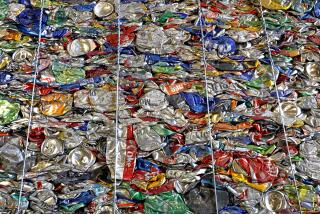Flushed With Success : Run on Rebates for New Toilets Leaves City Fund Dry
- Share via
In their April water bills, amid the information sheets about water rationing, Glendale residents received a slick brochure offering $100 rebates for converting from conventional toilets to water-saving models.
Initially, the city planned to pay only 1,000 rebates as part of a broader effort to help people save water during the drought. But when residents rushed to take advantage of the offer, officials quickly doubled the available funds so 2,000 could be accommodated.
But despite the increase, a run on the program left the rebate fund high and dry by the end of June.
Between 600 and 800 people who have returned their applications in the interim are on a waiting list in case more money is made available.
“We have a few customers who are not too thrilled,” Hector Gutierrez, a city conservation assistant, said. But he said rebate flyers noted that the limited funds would be passed out on a first-come, first-serve basis.
About half the money for the program came from the Metropolitan Water District, the rest from the city treasury.
Valerie Apmadoc, the conservation coordinator for Glendale’s Public Service Department, said she was not surprised by the flood of applications and added that the MWD may provide more rebate money if the city can demonstrate a significant reduction in water use due to the low-flow toilets. It could, however, take months before the money is awarded.
Old toilets in good working condition are being accepted at the city’s Public Service Yard for donation to Habitat for Humanity, an organization that builds low-income housing in Third World countries.
About 170 people have brought their old toilets to the yard at 800 Air Way, and volunteers are scheduled to pick them up this month to drive them to San Diego, where they will be stored. Glendale’s sanitation department also picks up old toilets for disposal.
Some Glendale residents were angry when they learned that their applications arrived too late for them to obtain the rebates after they had gone to the expense of installing new toilets.
An ultra low-flow toilet ranges in price from $50 to $250, without installation. Applicants for the rebates must also obtain a $25 city permit to conduct the work.
Apmadoc said “people are going to be getting the benefits of lower sewer costs and water consumption charges. So it is a good deal for them.”
Conventional toilets use between 3.7 and 7 gallons of water per flush; low flow toilets use just 1.6 gallons.
“Even if a person had to flush a low-flow twice, they would still be saving,” Apmadoc said.
When residents call the city now, they are told that the rebates are no longer available, but are nevertheless encouraged to convert their toilets, Gutierrez said.
Many people, he said, made the switch anyway.
More to Read
Sign up for Essential California
The most important California stories and recommendations in your inbox every morning.
You may occasionally receive promotional content from the Los Angeles Times.













